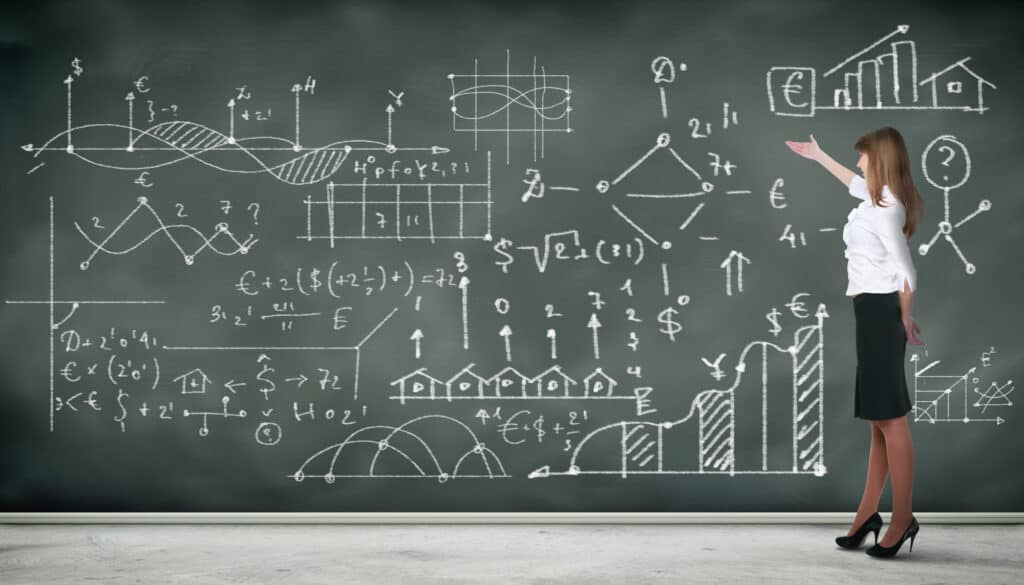Data scientists evaluate and interpret data logically and with standardized methods. In a sense, this makes data scientists fortune tellers without the crystal ball. How? Data scientists analyze historical data to create a predictive model that helps their company and leaders make mission-critical decisions.
So, what is a data scientist, and what does a data scientist do?
What Is a Data Scientist?
A data scientist analyzes and interprets past data to create models to predict the most likely outcome. Decision-makers use the analysis to help them make decisions that impact the business’s future.
This is different from a data analyst who uses data to answer questions about the past. For example, a data analyst would answer the question, “Was it worth it to attend that conference?” while a data scientist would answer, “Should we attend the next conference?”
>>More: Data Analyst vs. Data Scientist: What’s the Difference?
How Much Do Data Scientists Make?
According to the Bureau of Labor Statistics (BLS), the median annual data scientist salary was $103,500 in May 2022. Data scientists in the scientific research and development services field had the highest median annual wage of $118,620, while those working in management, scientific, and technical consulting fields had the lowest median annual data scientist salary of $101,760.
The BLS anticipates openings for data scientist jobs will grow 35% between 2022 and 2032, down 1% from the previous prediction for 2021 through 2031 but still much faster than average. However, the job vacancy rate is predicted to be 17,700 per year — up compared to the predictions for 2021 through 2031, which was 13,500 vacancies per year.
What Does a Data Scientist Do?
According to Saket Saurabh, cofounder and CEO of Nexla, a data scientist helps a business “make a decision based on some understanding of the future. [Data scientists] predict what will work and make decisions on what to do.”

Data Science
Experience what it's like to work as a data scientist in this free course from BCG. Discover more about the challenges data scientist tackle and how they are solved.
Avg. Time: 5-6 hours
Skills you’ll build: Hypothesis framing, programming, exploratory data analysis, data visualization, mathematical modeling
Data scientists often work on multiple projects spanning weeks or months and those projects align with the company’s goals and objectives. They start by analyzing past data to form a hypothesis, then build a predictive model to test that theory. The data scientist examines the results and adjusts the model until they get the desired results.
Here’s an example.
Say an e-commerce company wants to get consumers to return to the site and purchase their abandoned cart. A data scientist will review the company’s data about consumers who abandoned their carts and propose a possible solution. That solution might be to send a 10% off coupon after the cart’s been abandoned for seven days. The data scientist then writes a program that keeps track of abandoned carts and, after seven days, send out the coupon.
But that’s not the end of the work. As the program runs, the data scientist has new data to analyze. Did the initial prediction (sending 10% off coupons) work? If consumers don’t respond to the 10% off coupon, the data scientist creates a new model — maybe it’s a 20% coupon after 10 days — and writes a new script with the new parameters.

Data Science
Learn what it takes to be a data scientist in this free course from British Airways. You'll analyze customer data and take your findings to program a predictive model.
Avg. Time: 2.5 hours
Skills you’ll build: Web scraping, data manipulation, machine learning, data visualization, Python
The data scientist analyzes the results again, and if the company is satisfied (the 20% off coupon results in 15% more people buying their abandoned carts), the data scientist moves on to a new project. If the company is dissatisfied with the results, the data scientist takes the new information, forms a new hypothesis, and runs another test until the company gets the desired results.
What Industries Do Data Scientists Work In?
Data scientist jobs are often available in any industry or company that wants to incorporate data in their decision-making algorithms. While e-commerce and marketing seem like obvious choices, data scientists work in an array of fields, including:
- Agriculture
- Human resources
- Risk management
- Public policy
- Social science
- Natural language processing
- Medicine
- Travel
As a rule, data scientists don’t specialize in a particular sector or industry. However, to be successful in any data science role, they need a deep understanding of “how the business works and what problems you’re solving,” says Saurabh. “They bring domain know-how and understanding the data together.”
This means you also need a thorough understanding of your industry. Building any data model requires math and coding skills. But the model you build for a financial services firm is not the same as a model you’d build for an e-commerce company.
How to Become a Data Scientist
Saurabh says that to become a data scientist, you need a strong foundation in math and coding. While you’ll build this foundation at school, you’ll also learn a lot of the necessary skills on the job.
You’ll likely start in data analysis, learning to query data sets and create data visualizations with the results. From there, you can move into coding the predictive models.
Having a data science degree is not a requirement. A degree in math or computer sciences is acceptable. You could also possess a degree in any field or even proceed without a degree if you can prove you have the necessary skills to be successful in the role.
Data Visualisation
Learn more about the questions data scientists answer in this free course from Tata. You'll anticipate the questions business leaders will want answered, learn how to choose the right visuals for your presentation, and communicate your findings.
Avg. Time: 4.5 hours
Skills you’ll build: Data analysis, visualization, data interpretation, data cleanup, analytics and insights.
Saurabh notes that one way to demonstrate your ability is to complete independent data science projects. As an example, you can form a question or hypothesis, then analyze publicly available data (like U.S. census data) to answer your question. It’s a great way to prove you’ve got what it takes to be a data scientist outside of an internship or a traditional education.
What Skills Does a Data Scientist Need?
In addition to the hard skills of math, science, and programming, Saurabh points out that there is often a human element to data science, so soft skills are just as critical to your success.
>>Build practical data skills: The Best Data Job Simulations on Forage to Jumpstart Your Career
Collaboration
Though data scientists spend a fair portion of their work day crunching numbers, that’s not all they do. They also talk to other people in the business to understand the problems they face or the goals the company is trying to achieve. Without this information, a data scientist can’t properly create the predictive models, so the ability to collaborate is critical.
Communication
Data scientists use written and verbal communication. They may talk to the revenue team to see what kinds of improvements they’re hoping to see and formulate a hypothesis based on that discussion. Data scientists also create data visualizations and write up their findings. They may even give presentations to multiple stakeholders and have to translate the findings into something that’s understandable for everyone.
Active Listening
Data scientists speak with stakeholders who want to predict something. But sometimes that “thing” isn’t always clear. This is where active listening skills come in handy. Data scientists need to listen carefully to ensure they’re building models that answer the right questions.
Curiosity
Data scientists also need to be curious. Though they collaborate with other teams, there may be times they’re given data and need to figure out what’s happening without having a clear idea of what they’re looking for. Being curious and wanting to know more will help a data scientist figure things out and answer questions people didn’t realize they had.
Technical Skills
Technical skills are, of course, must-have skills for a data scientist. They need to be familiar with different kinds of data collection and manipulation, such as an Excel spreadsheet or a data program like Sigma.
Growth Mindset
Even though these aren’t technically skills, Saurabh says that demonstrating you’re committed to learning and possessing a growth mindset are essential. Without those, you likely won’t be able to keep up with the changes in the field or create new models based on new data.
Explore other careers in data. Check out all of Forage’s free courses.
Image credit: SergeyNivens / Depositphotos.com
